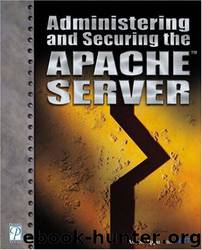Administering and Securing the Apache Server by Ashok Appu

Author:Ashok Appu [Appu, Ashok]
Language: eng
Format: epub
Tags: Computers, General, Computer Programs, Web Sites, Security, Client-Server Computing, Web Servers, Security Measures, Apache (Computer File : Apache Group)
ISBN: 9781592000036
Google: PeGE-znRvfQC
Amazon: 1592000037
Barnesnoble: 1592000037
Publisher: Premier Press
Published: 2002-10-01T07:00:00+00:00
This argument enables DSO support on most platforms. However, on some platforms, you need to specify the following:
--enable-rule=SHARD_CORE
The preceding argument causes most of the code that comprises the Apache binary to be compiled into the DSO module libhttpd.so.
Next, to compile most of the standard Apache modules as DSO modules, you specify the following argument:
--enable-shared=max
The preceding statement uses DSO while compiling the modules with Apache.
You can also use a combination of the --enable-module and --enable-shared arguments to enable individual modules and to compile them as DSO modules.
The LoadModule and the AddModule directives can be located anywhere in the httpd.conf file. However, you need to ensure that the LoadModule directive is included before the AddModule directive. Whenever you add a LoadModule directive, a corresponding AddModule directive should be added. To disable a module, you can comment out the corresponding AddModule entry for the module. However, this is waste of resources because the module is loaded anyway, even though it is not used. On the other hand, if you specify a module in the AddModule directive for which the corresponding entry in the LoadModule directive is not present or is commented out, you might get a configuration error. This error occurs because you are trying to enable a module that is not available to the server.
The order in which the modules are specified in the LoadModule and AddModule directives is critical for the functioning of the server, because sometimes one module is dependent on another module. Specifying a module that is dependent on another module that is not loaded will produce an error. Also, modules affect the request object that is passed from module to module in the various stages of request processing. As a result, the effect of a change of a request object is passed on to all the subsequent modules. Apache, by default, has a well-planned sequence of modules that behaves correctly. If you change this order, changes in the request object might cause behavior that is really hard to debug—unless you fully understand how Apache works.
Download
This site does not store any files on its server. We only index and link to content provided by other sites. Please contact the content providers to delete copyright contents if any and email us, we'll remove relevant links or contents immediately.
Kotlin in Action by Dmitry Jemerov(19234)
Grails in Action by Glen Smith Peter Ledbrook(16726)
Sass and Compass in Action by Wynn Netherland Nathan Weizenbaum Chris Eppstein Brandon Mathis(14219)
Configuring Windows Server Hybrid Advanced Services Exam Ref AZ-801 by Chris Gill(7513)
Azure Containers Explained by Wesley Haakman & Richard Hooper(7512)
Running Windows Containers on AWS by Marcio Morales(7064)
Microsoft 365 Identity and Services Exam Guide MS-100 by Aaron Guilmette(5447)
Microsoft Cybersecurity Architect Exam Ref SC-100 by Dwayne Natwick(5286)
Combating Crime on the Dark Web by Nearchos Nearchou(5035)
The Ruby Workshop by Akshat Paul Peter Philips Dániel Szabó and Cheyne Wallace(4720)
Management Strategies for the Cloud Revolution: How Cloud Computing Is Transforming Business and Why You Can't Afford to Be Left Behind by Charles Babcock(4562)
Python for Security and Networking - Third Edition by José Manuel Ortega(4291)
The Age of Surveillance Capitalism by Shoshana Zuboff(4272)
Learn Wireshark by Lisa Bock(4192)
Learn Windows PowerShell in a Month of Lunches by Don Jones(4175)
Ember.js in Action by Joachim Haagen Skeie(4052)
The Ultimate Docker Container Book by Schenker Gabriel N.;(3936)
DevSecOps in Practice with VMware Tanzu by Parth Pandit & Robert Hardt(3624)
Windows Ransomware Detection and Protection by Marius Sandbu(3596)
